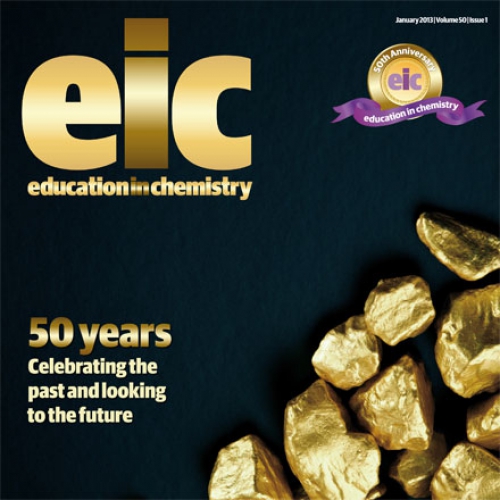Karen J Ogilvie looks behind the scenes of EiC 50 years ago
Education in Chemistry was founded 50 years ago by Ronald S Nyholm and continues to fly the flag for innovation and best practice in chemistry teaching.

As we are celebrating
EiC’s 50th anniversary year, I thought you may like to know a bit about its background.
It was quite difficult to choose exactly when the anniversary actually should be. Should it be volume 50? Should it be from the initial conception, the formation of the editorial board, the appointment of staff, the commissioning of articles or the publication date? ‘All of the above’, seemed to be reasonable. In the end, I decided that volume 50 in its entirety should be one big celebration.
To reach this conclusion, I had to do a bit of historical research down in the basement at Burlington House, where Kate Bennett (librarian) kindly helped me to search the archives for essential information that was locked away within the secrets of Chemical Society minute books.
In the beginning… the proposal
For the full story, I had to go back to a report from the Education Committee meeting held on 17 November 1962 and discussed at the Council meeting on 14 December 1962 - an investigation had been started to determine the feasibility of a ‘British Journal of Chemistry Education’. After considering various recommendations, the scope and content was agreed and the Committee suggested that the Royal Institute of Chemistry (RIC) should retain control of the title. A plea was made to launch the journal as soon as possible.
Funding agreed
Minutes from the Council meeting held in March 1963, recorded a letter from the trustees of the Nuffield Foundation who been approached by Professor Ronald S Nyholm (after whom the RSC Education Award is named) which stated that they were prepared to make a ‘repayable grant of £10,000 to meet initial launch costs and establish the journal which would be produced by the RIC.’ The offer was accepted by Council. One of the conditions attached to the offer was the appointment of an independent editorial Advisory Board for the production and management of the journal.
Editorial board appointed
In June 1963, all of the invitations to serve on the Editorial Advisory Board had been accepted and Professor Nyholm was appointed Chair. It was agreed that the journal should be called
Education in Chemistry. It was also announced that the editor would be Dr FW Gibbs, so we can justifiably celebrate the 50
th anniversary in 2013.
The Editorial Advisory Board met in July 1963 to discuss the shape and content of the journal. It was noted that suggestions for articles had already been received. An Education Committee report from October 1963 states that
Education in Chemistry would be published quarterly. It records Dr Gibbs’ plans for the launch and that the first issue would be January 1964.
Publicity
Publicity leaflets were distributed in October 1963 with the
Journal of the [Chemical]
Institute and the
School Science Review, to attract subscribers in the UK and Overseas.
Spotlight on Volume 1, issue 1
So here we 50 years on and able to look back at the very first feature published in
Education in Chemistry: ‘Modelling of chemical structures with expanded polystyrene spheres’ by KS Teplow. This is a fascinating feature and reading this you will see that chemistry teachers 50 years ago not only had to know their subject, they had to be master model makers too! Honestly, what did we do without Molymod Kits or Cochrane’s Orbit sets?
The time and skills needed to make molecular models 50 years ago would appear to be a luxury that we no longer have. You will find this article on our website at
http://rsc.li/EiCV1I1a. During the year I will make more of the early
Education in Chemistry articles available through the website and Learn Chemistry.
50th anniversary prizes
In recognition of
Education in Chemistry’s 50
th anniversary, Molymod have kindly donated kits as prizes for anniversary competitions.
Sign up for the e-alert at http://rsc.org/e-alert to find out about competitions and how you can win prizes for your class.
[A note from Duncan: Check out Education in Chemistry's 50th anniversary issue, one of our featured resources on the Learn Chemistry homepage this month]
